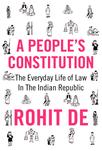Rohit De
Associate Professor
Office:
HQ 243
Phone:
203-432-4233
Fields of interest:
Modern South Asia (India, Pakistan, Bangladesh), Global Legal History, Law and Society, Law and Colonialism, British Empire, Nationalism and Decolonization in Asia and Africa, Comparative Constitutionalism
Bio:
Rohit De is a lawyer and historian of modern South Asia and focuses on the legal history of the Indian subcontinent and the common law world. As a legal historian he moves beyond asking what the law was; to what actors thought law was and how this knowledge shaped their quotidian tactics, thoughts and actions. In recent years, this has enabled his research to move beyond the political borders to South Asia to uncover transnational legal geographies of commerce, migration and rights across East Africa, Southeast Asia and the Caribbean.
His book A People’s Constitution: Law and Everyday Life in the Indian Republic (Princeton University Press, 2018) explores how the Indian constitution, despite its elite authorship and alien antecedents, came to permeate everyday life and imagination in India during its transition from a colonial state to a democratic republic. A People’s Constitution won the Willard C Hurst Prize for the Best Book on Socio-Legal History from the Law and Society Association, the Heyman Prize in the Humanities from Yale University, the sole Honorable Mention for the Peter Gonville Stein Prize from the American Society for Legal History and was a finalist for the Kamaladevi Chattopadhayay Prize from the New India Foundation. It is currently being translated into Hindi, Marathi, Tamil and Malayalam.
His second book, Assembling the Indian Constitution, coauthored with Ornit Shani, examines at how thousands of ordinary Indians, read, deliberated, debated and substantially engaged with the anticipated constitution at the time of its writing and will be published in 2023.
He was awarded a Carnegie Fellowship in 2020 to support his research on Rights from the Left: Decolonization, Diasporas and a Global History of Rebellious Lawyering, which follows the careers of lawyers who defended unpopular causes across borders and over time, to offer an alternate history of universal rights and civil liberties that arise out of Asia and Africa and is mediated through India, Chinese and Caribbean diasporas. It charts how political trials and social movement lawyering in in Kenya, Tanzania, Ghana, Seychelles, India, Pakistan, Bangladesh, Sri Lanka, Malaysia, Singapore, Jamaica, British Guyana and the United Kingdom, were produced by, and as part of, a transnational movement for civil liberties. The project also supported by the SSRC stands at the intersection of multiple fields: histories of human rights; decolonization and the Cold War; diaspora studies; and history of the legal profession.
Prof De is also interested in comparative constitutional law and is an Associate Research Scholar in Law at the Yale Law School. He has assisted Chief Justice K.G. Balakrishnan of the Supreme Court of India and worked on constitution reform projects in Nepal and Sri Lanka. He writes on contemporary legal issues in South Asia.
Prof De received his Ph.D from Princeton University, where he was elected to the Society of Woodrow Wilson Scholars. His dissertation won the Law and Society Association Prize for best representing outstanding work in law and society research in 2013. He has held fellowships from the Social Science Research Council, the Davis Centre for Historical Studies at Princeton University, the Melbourne Law School, and the Centre for Asian Legal Studies at the National University of Singapore.
He was the Mellon Postdoctoral Fellow at the Centre for History and Economics and a fellow of Trinity Hall at the University of Cambridge before coming to Yale in 2014. Rohit received his law degrees from the Yale Law School and the National Law School of India University, Bangalore.
Rohit teaches undergraduate and graduate courses on South Asian history; postcolonial histories of India, Pakistan and Bangladesh; on Indian constitutional culture and political thought, South Asian diasporas and migration as well as courses on global legal history, law and colonialism and the legal profession. You can learn more about his work in his interview in the Yale Historical Review and the Macmillan Report.
Books
A People’s Constitution: Law and Everyday Life in the Indian Republic (Princeton University Press, 2018)
Book Launch and Panel Discussion at India International Centre, New Delhi, January 8, 2019
Interview on NDTV India: Prime Time on A People’s Constitution. Nov 23, 2018
Assembling India’s Constitution (coauthored with Ornit Shani) (Cambridge University Press, 2023)
A Jurisprudence of Decolonization: Civil Liberties, Diasporas and a Global History of Rebellious Lawyers (draft in progress)
Refereed Articles and Peer Reviewed Chapters
-
(with Ornit Shani),”Assembling India’s Constitution: Towards a New History”, Past and Present, May 2023
-
“The Possibilities of Anti-Colonial Constitutionalism: A Commentary on State of West Bengal v. Anwar Ali Sarkar, AIR 1952 SC 75, VRÜ Verfassung und Recht in Übersee , Issue 1 (2023) 33-47.
-
“The Jurisprudence of Decolonization: The Postcolonial Career of D.N Pritt and the Practice of Rebellious Lawyering”, Humanity (forthcoming)
-
“Empire of Laws”, Cambridge History of the Indian Subcontinent, Volume 3 (David Gilmartin, Manu Goswami and Mrinalini Sinha, editors) (under review)
-
The Indian Constitution: Moment, Epics and Everyday Lives”. International Journal of Constitutional Law, 18 (3) 2020, 1022-1030
-
Between Midnight and Republic: Theory and Practice of India’s Dominion Status, Volume 17: Issue 4 International Journal of Constitutional Law, 2019
-
Petitioning and Political Cultures in South Asia, coauthored with Robert Travers, Modern Asian Studies, Volume 53, Issue 1. 2019 p. 1-20.
-
Cows and Constitutionalism, Modern Asian Studies Volume 53, Issue 1. 2019 p. 240-247.
-
The Republic of Petty Bureaucrats: Upendra Baxi and the Pathology of Civil Service Jurisprudence, Jindal Global Law Review (2019), Vol 9, Issue 2, 2018, 335-350.
-
“Lawyering as Politics: The Legal Career of Dr. Ambedkar, Bar-at-Law”, in Suraj Yengde and Anand Telbumbe eds., The Radical in Ambedkar: Critical Reflections, (Penguin: London and New Delhi, 2018).
-
“Evacuee Property and the Management of Economic Life in Postcolonial India” in Gyan Prakash, Michael Laffan and Nikhil Menon eds., The Postcolonial Moment in South and South-east Asia (London: Bloomsbury, 2017)
-
Constitutional Antecedents in The Oxford Handbook to the Indian Constitution, Sujit Choudhary, Madhav Khosla and Pratap Bhanu Mehta eds.,(New York: Oxford University Press, 2015)
-
A Peripatetic World Court” Cosmopolitan Courts, Nationalist Judges and the Indian Appeal to the Privy Council.” Law and History Review 32, no. 04 (2014): 821-851.
-
Rebellion, Dacoity, and Equality The Emergence of the Constitutional Field in Postcolonial India. Comparative Studies of South Asia, Africa and the Middle East 34, no. 2 (2014): 260-278.
-
‘Commodities must be controlled’: Economic Crimes and Market Discipline in India (1939–1955). International Journal of Law in Context 10, no. 03 (2014): 277-294.
-
“The Federal Court and Civil Liberties in Late Colonial India” in T. Halliday, L. Karpik, M. Feeley (eds.)Fates of Political Liberalism in the British Post-Colony: The Politics of the Legal Complex (Cambridge: Cambridge University Press, 2012) pp.59-90
-
“Beyond the Social Contract“ Seminar Magazine: Special Issue on 60 years of the Indian Constitution, November 2010
-
“The Two Husbands of Vera Tiscenko: Apostasy, Conversion and Divorce in Late Colonial India” 28 (4) Law and History Review (2010) pp.1011-1041
-
“Mumtaz Bibi’s Broken Heart: The Many Lives of the Dissolution of Muslim Marriages Act, 1939” 46:1 Indian Economic and Social History Review ( 2009) pp.105-130 (Co-author)
-
(Co-author) “Introduction: Personal Law, Identity Politics and Civil Society in Colonial South Asia” 46:1 Indian Economic and Social History Review ( 2009) pp.1-4
Special Issues Edited
(with Robert Travers) “Petitioning and Political Cultures in South Asia”, Modern Asian Studies, Vol 53, Issue 1 (2019)
Translations of Work
-
“Samajik Karak se Pare”, in Pranjal, Shipra Kiran and Sanjeev Kumar eds., किसका संविधान, किसका देश? (वाम प्रकाशन, New Delhi, 2020) 66-80
-
“The Case of the Honest Prostitute: Sex, Work and Freedom in the Indian Republic” (translated to Japanese), 雑誌 都市文化研究 (Studies in Urban Culture) (forthcoming Dec 2020)
-
“हम अब भारतीय गणतंत्र का एक और पुनराविष्कार देख रहे हैं !” (Pamphlet)
Book Reviews and Essays
-
“How to Write New Constitutional Histories? The Casebook of Everyday Life.” Asian Journal of Comparative Law 15, no. 2 (2020): 394-401.
-
Murder Mystery, Legal History: Three Essays, Legal History Blog, 24th May 2020, 27th May 2020, 4th June, 2020.
-
“Revolutionary Lives and Afterlives: Archives, Gender and Region”, Book Roundtable: New Histories of Political Violence and Revolutionary Terrorism in Modern South Asia, South Asia: History and Culture, (2019) 10(3), pp.340-360.
-
“The Once and Future Constitution”, India Today¸ May 3rd 2019.
-
“Sedition, Securitization and Sexuality: A Conversation Between Rohit De and Inderpal Grewal”, South Asia Multidisciplinary Academic Journal (SAMAJ) May 2 (20) (2019)
-
“South Asian Legal Culture,. In: James D. Wright (editor-in-chief), International Encyclopaedia of the Social & Behavioral Sciences, 2nd edition, Vol 23. Oxford: Elsevier. pp. 58-62, 2015
-
Law, Disorder and the Colonial State: Corruption in Burma c.1900 (London: Palgrave Macmillan, 2012) South Asia History and Culture 6 (2), 310-313 (2014)
-
Constitutional Nationalism and Legal Exclusion: Equality, Identity Politics and Democracy in Nepal (Oxford University Press, 2012) in 5 (Winter) Journal of Indian Law and Society (2014)
-
“Tools of Justice: Non‐discrimination and the Indian Constitution. By Kalpana Kannabiran. New Delhi: Routledge, 2012. 505 pp. Rs 995, $105.00 cloth.“ Law & Society Review 48, no. 3 (2014): 687-689.
-
“Litigation”, R.Dwyer, G. Dharmpal Frick, J.Phalkey and M. Kirloskar-Steinbach (eds.) Key Concepts in Modern Indian Studies (Oxford University Press, New Delhi, 2013).
-
“Jurist’s Prudence: The Indian Supreme Court’s Responses to Institutional Challenges” , ICONNECT Blog, December, 12, 2012
Opinion Pieces and Essays
-
“ The Constitution Has Always Inspired Indians to Question Power” Indian Express, Jan 26, 2020.
-
“For People to Wield this Bound Aaron’s Rod”, Outlook India Magazine, December 25, 2019,
-
Co-author with Surabhi Ranganathan, “We are Witnessing the Rediscovery of India’s Republic” New York Times, December 27, 2019,
-
Coauthored with Tarunabh Khaitan, “What Constitutionalism Calls For: The Judges Who Called out the Institutional Breach are not the Mutineers”, Times of India, Jan 16, 2018
-
“No, the Uniform Civil Code was not deferred just for Muslims” Times of India, September 28, 2017
-
“ A Nuanced Judgment”, Frontline, September 15, 2017
-
“Who Moved my Beef? Regulatory Change and the Pink Revolution” Nov 18, 2013, Hindu Business Line
-
“What Didi Wants: The Case for a Federal Front”, The Indian Express, April 22, 2014
-
“Personal Laws: A Reality Check” (Cover Story), Frontline, September 16, 2013,
-
“Civil and Uncivil Codes”, India in Transition Series, Centre for the Advanced Study of India, University of Pennsylvania, Jan 2011
-
“ The Legal Career of Mohammad Ali Jinnah”, 10th November, 2010 (2 parts)
-
“Mirror Images”, The Indian Express, 29th August, 2009
Online Talks, Interviews and Podcasts
-
Indian Blog of International Law, April 3, 2022
-
Digging a Hole: A Legal Theory Podcast, Episode 33, March 10, 2022
-
“A Constitution as a Sword and a Shield”, Newsclick.in, Jan 26, 2022
-
India Colonised, Episode 26, 2021
-
Puliyabaazi, Episode 82, Ek Jan Samvidhan, Jan 26 2021
-
“People are Protesting to Remind the Government of Constitutional Values”, Economic Times, Jan 26, 2020
-
“A People’s Digital Republic”, LiveLaw India, Jan 14, 2020
-
“Prime Time with Ravish Kumar”, NDTV India, 23 Nov 2018
-
“Vakil Raj and Swaraj: The legal careers of Motilal Nehru, Jinnah and Ambedkar”, Nehru Memorial Museum and Library, January 2014.
-
“The Republic Without a Pub is Relic: Prohibition and the Everyday Life of Constitutional Law in the Indian Republic”, King’s India Institute, London 2013.
Period:
Modern
Recent
Geography:
Global/International
Indian Ocean
South Asia
Thematic:
Cultural
Economic
Empires & Colonialism
Intellectual
Legal
Political
Race & Ethnicity

